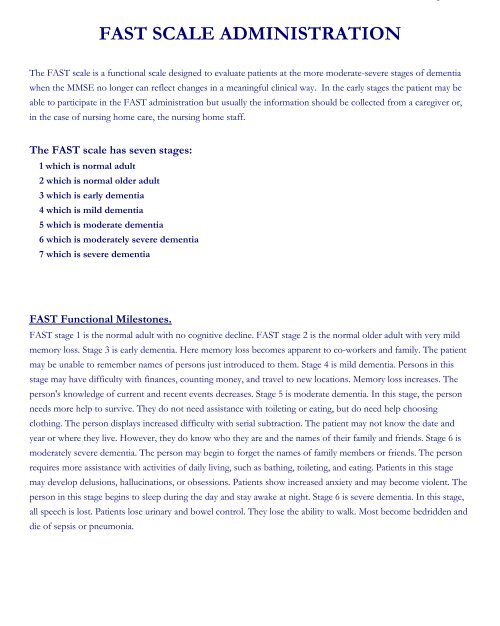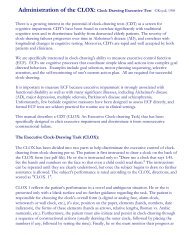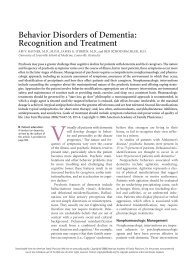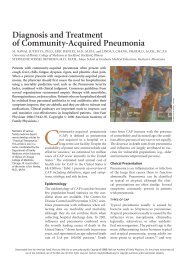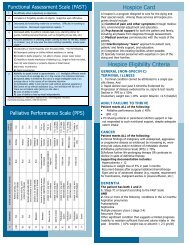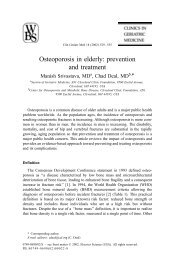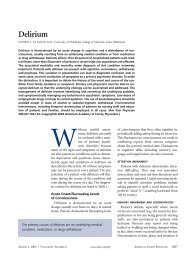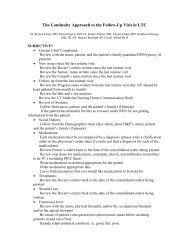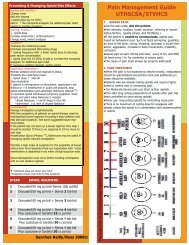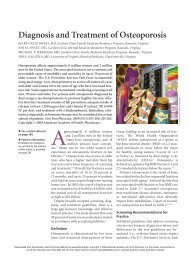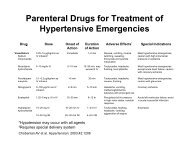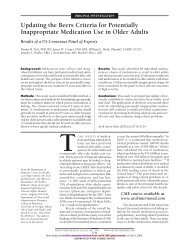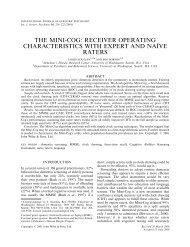FAST SCALE ADMINISTRATION
FAST SCALE ADMINISTRATION
FAST SCALE ADMINISTRATION
- No tags were found...
Create successful ePaper yourself
Turn your PDF publications into a flip-book with our unique Google optimized e-Paper software.
<strong>FAST</strong> <strong>SCALE</strong> <strong>ADMINISTRATION</strong>The <strong>FAST</strong> scale is a functional scale designed to evaluate patients at the more moderate-severe stages of dementiawhen the MMSE no longer can reflect changes in a meaningful clinical way. In the early stages the patient may beable to participate in the <strong>FAST</strong> administration but usually the information should be collected from a caregiver or,in the case of nursing home care, the nursing home staff.The <strong>FAST</strong> scale has seven stages:1 which is normal adult2 which is normal older adult3 which is early dementia4 which is mild dementia5 which is moderate dementia6 which is moderately severe dementia7 which is severe dementia<strong>FAST</strong> Functional Milestones.<strong>FAST</strong> stage 1 is the normal adult with no cognitive decline. <strong>FAST</strong> stage 2 is the normal older adult with very mildmemory loss. Stage 3 is early dementia. Here memory loss becomes apparent to co-workers and family. The patientmay be unable to remember names of persons just introduced to them. Stage 4 is mild dementia. Persons in thisstage may have difficulty with finances, counting money, and travel to new locations. Memory loss increases. Theperson's knowledge of current and recent events decreases. Stage 5 is moderate dementia. In this stage, the personneeds more help to survive. They do not need assistance with toileting or eating, but do need help choosingclothing. The person displays increased difficulty with serial subtraction. The patient may not know the date andyear or where they live. However, they do know who they are and the names of their family and friends. Stage 6 ismoderately severe dementia. The person may begin to forget the names of family members or friends. The personrequires more assistance with activities of daily living, such as bathing, toileting, and eating. Patients in this stagemay develop delusions, hallucinations, or obsessions. Patients show increased anxiety and may become violent. Theperson in this stage begins to sleep during the day and stay awake at night. Stage 6 is severe dementia. In this stage,all speech is lost. Patients lose urinary and bowel control. They lose the ability to walk. Most become bedridden anddie of sepsis or pneumonia.
Functional Assessment Staging of Alzheimer’s Disease. (<strong>FAST</strong>)©STAGE SKILL LEVEL1. No difficulties, either subjectively or objectively.2. Complains of forgetting location of objects. Subjective word finding difficulties.3.Decreased job function evident to co-workers;difficulty in traveling to new locations. Decreased organizational capacity.*4. Decreased ability to perform complex tasks (e.g., planning dinner for guests),handling personal finances (forgetting to pay bills), difficulty marketing, etc.5. Requires assistance in choosing proper clothing to wear for day, season,occasion.6a.b.Difficulty putting clothing on properly without assistance.Unable to bathe properly; e.g., difficulty adjusting bath water temperature)occasionally or more frequently over the past weeks.*c. Inability to handle mechanics of toileting (e.g., forgets to flush the toilet,does not wipe properly or properly dispose of toilet tissue) occasionally ormore frequently over the past weeks.*d.e.Urinary incontinence, occasional or more frequent.Fecal Incontinence, (occasional or more frequently over the past week).7a. Ability to speak limited to approximately a half dozen different words or fewer,in the course of an average day or in the course of an intensive interview.b. Speech ability limited to the use of a single intelligible word in an average dayor in the course of an interview (the person may repeat the word over and over.c. Ambulatory ability lost (cannot walk without personal assistance).d. Ability to sit up without assistance lost (e.g., the individualwill fall over if there are no lateral rests [arms] on the chair).e. Loss of the ability to smile.©1984 by Barry Reisberg, M.D. All rights reserved.Reisberg, B. Functional Assessment Staging(<strong>FAST</strong>). Psychopharmacology Bulletin. 1988:24: 653-659.


